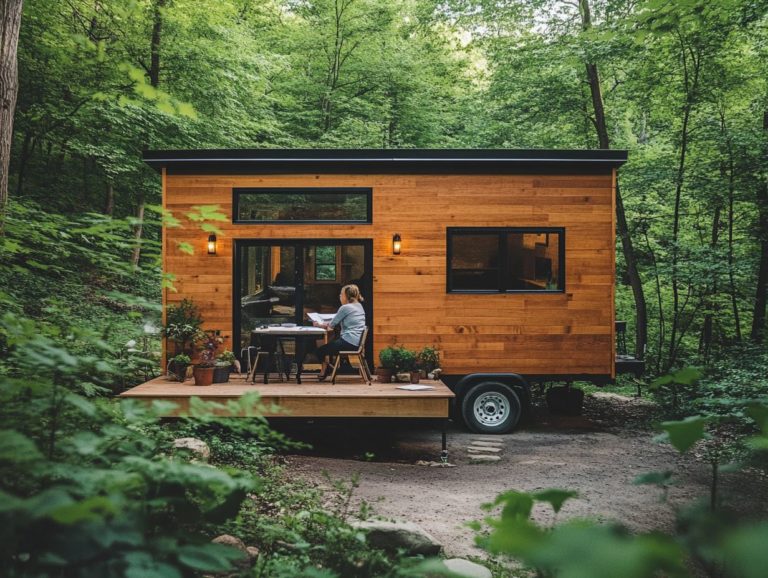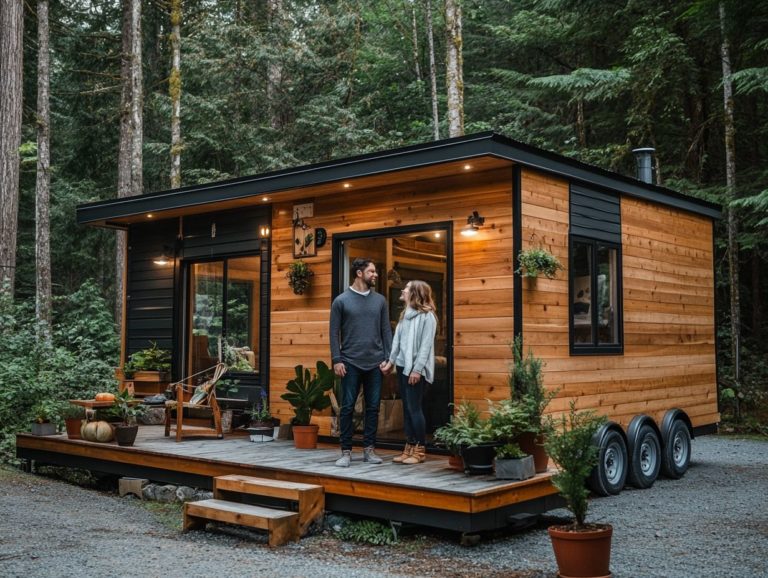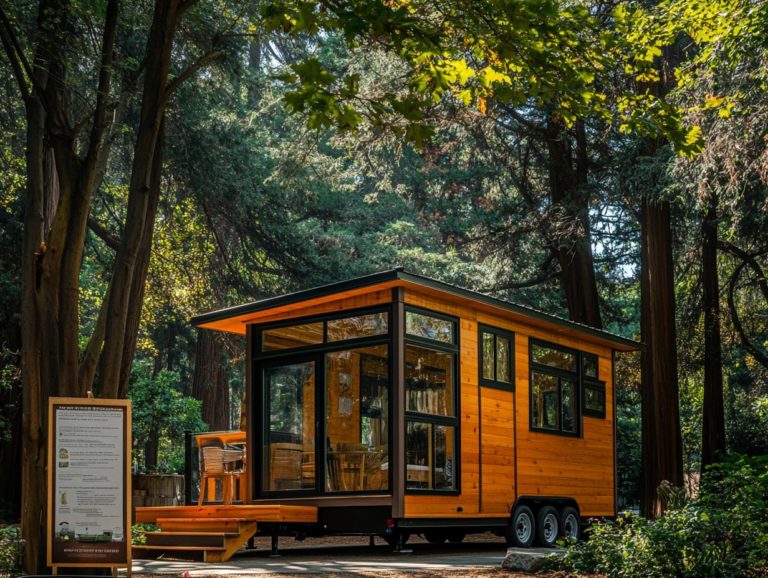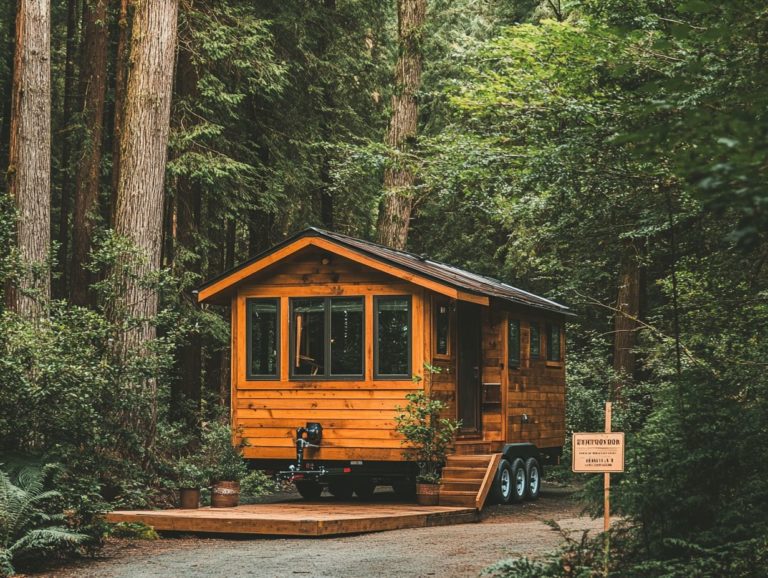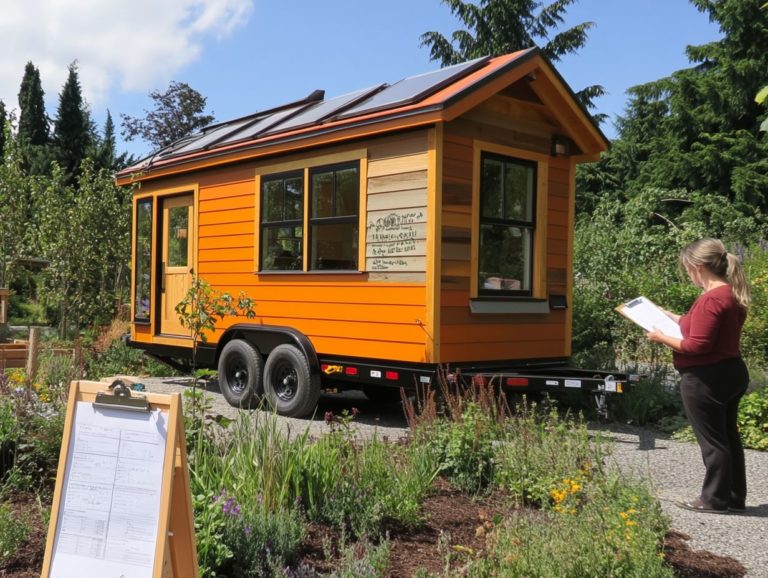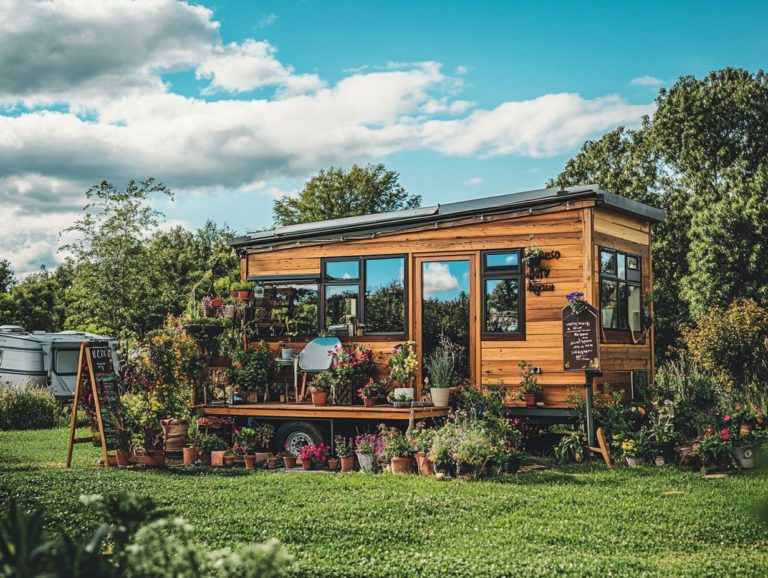Legal Implications of Tiny House Ownership
Tiny houses are exciting, but beware! They come with important legal considerations. With their rising popularity comes a maze of complexities surrounding legal ownership. This guide delves into the essential elements of tiny house living. It helps you navigate zoning laws and building codes while addressing financial implications and potential legal hurdles.
Whether you’re contemplating the purchase of a tiny house, exploring co-housing opportunities, or considering rental options, this information will arm you with the insights necessary to make well-informed decisions.
Contents
- Key Takeaways:
- Understanding Tiny Houses
- Legal Considerations for Tiny House Ownership
- Financial Implications of Tiny House Ownership
- Navigating Legal Challenges
- Dealing with Legal Issues and Disputes
- Alternative Options for Tiny House Living
- Co-housing and Community Living
- Renting and Leasing Options
- Frequently Asked Questions
- What are the legal implications of owning a tiny house?
- Do I need a building permit for my tiny house?
- Are there zoning restrictions for tiny houses?
- Can I legally live in a tiny house on my own property?
- What are the insurance implications of owning a tiny house?
- What are the tax implications of owning a tiny house?
Key Takeaways:
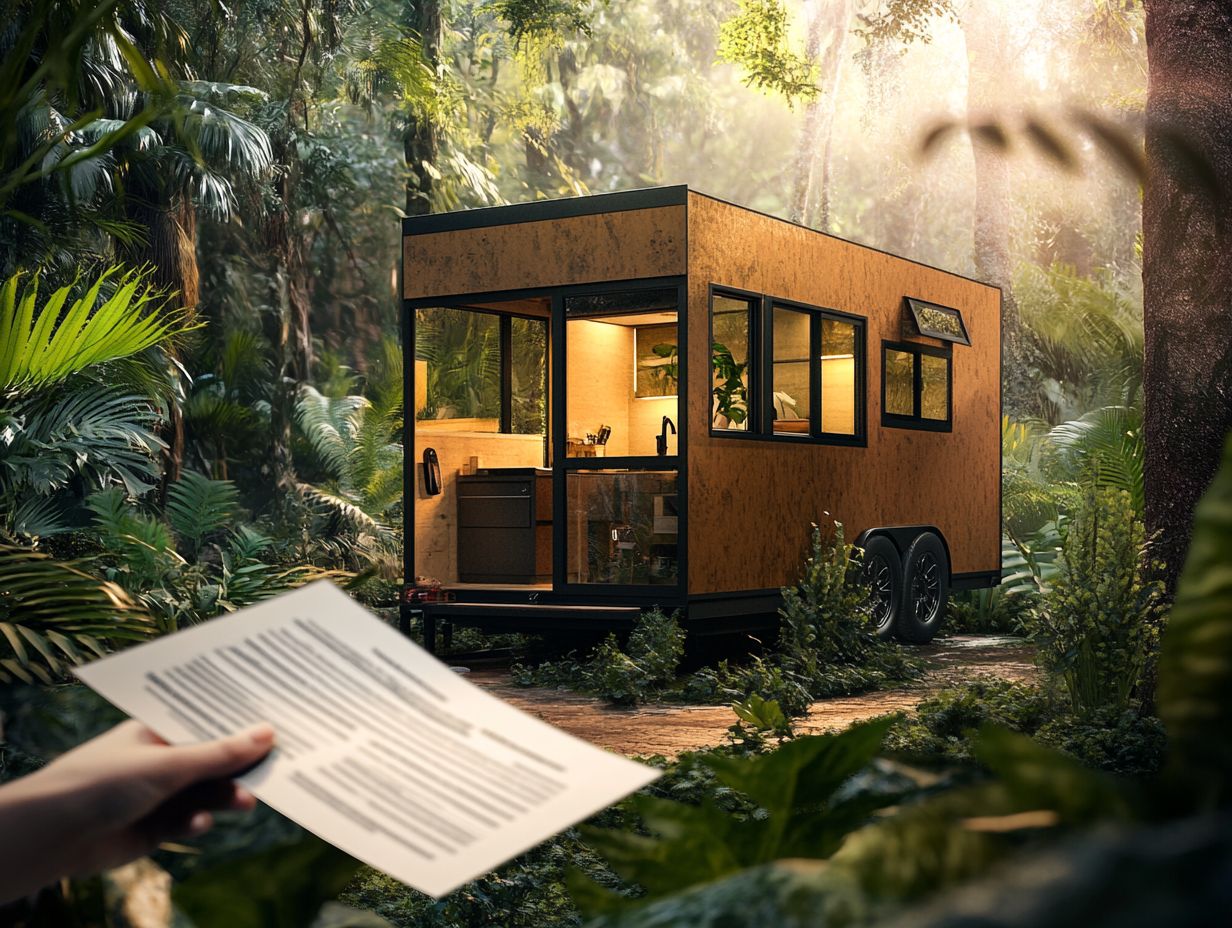
- Tiny houses are trendy, but they come with important legal considerations.
- Zoning laws and building codes, permits, and regulations are key factors to consider before purchasing or building a tiny house.
- Tiny house ownership also has financial implications, including costs, expenses, and potential tax impacts.
Understanding Tiny Houses
Understanding tiny houses is key today. The Tiny House Movement is gaining momentum across the United States. Tiny houses, whether on wheels or anchored to a foundation, offer a minimalist lifestyle that resonates with those longing for liberation from traditional housing constraints.
With an array of models from compact tiny homes to elegantly designed dwellings, this movement has its origins in states like California and Colorado. These areas often have zoning regulations that are more favorable, making it essential to understand navigating local ordinances for tiny houses, as the notion of downsizing is gaining traction among homeowners.
Defining Tiny Houses and Their Popularity
Tiny houses are residential units that typically range from 100 to 400 square feet. They provide a compact living space that encourages a minimalist lifestyle. It s no wonder they ve surged in popularity as part of the tiny house movement.
These delightful dwellings often come in two main forms: those on wheels, which allow you the freedom to travel, and those built on permanent foundations that provide stability and a true sense of place. Regardless of their structure, they share essential characteristics like efficient layouts and multifunctional furniture, catering to those who want to downsize and embrace simplicity. However, it’s important to understand the impact of local laws on tiny house living to ensure compliance and make the most of your tiny home experience.
This growing trend reflects a desire for lower living expenses and underscores a conscious effort to reduce environmental impact. For the eco-conscious consumer, tiny homes present a compelling choice that aligns with a sustainable lifestyle.
Legal Considerations for Tiny House Ownership
When considering tiny house ownership, it s essential to grasp the legal landscape. Laws and regulations regarding tiny houses differ greatly from one state or municipality to another. This variability is particularly pronounced when it comes to zoning laws, building codes, and how tiny houses are categorized whether as legal tiny houses or smaller homes on the same property as a larger home.
Understanding these nuances will enable you to navigate the complexities of tiny house living effectively.
Zoning and Building Codes
Zoning laws and building codes are crucial in determining where and how you can construct tiny houses. These rules often specify minimum ceiling heights and square footage, and they determine if the area is deemed tiny house friendly by the local zoning department.
Since these codes can vary widely, it’s essential to thoroughly research local regulations if you’re interested in tiny homes. For example, some jurisdictions might offer variances or exceptions that permit smaller homes or alternate foundation systems not typically allowed by standard codes. Familiarizing yourself with tiny house legal resources you should know can also be invaluable in this process.
Engaging with planning commissions and local zoning officials can provide valuable insights into potential loopholes or flexibility within the regulations. Understanding if the local community supports tiny housing initiatives can greatly affect the approval process and help you navigate the path to successful compliance.
Ready to explore your tiny house options? Dive deeper into the world of tiny living and discover how it can transform your lifestyle!
Permits and Regulations
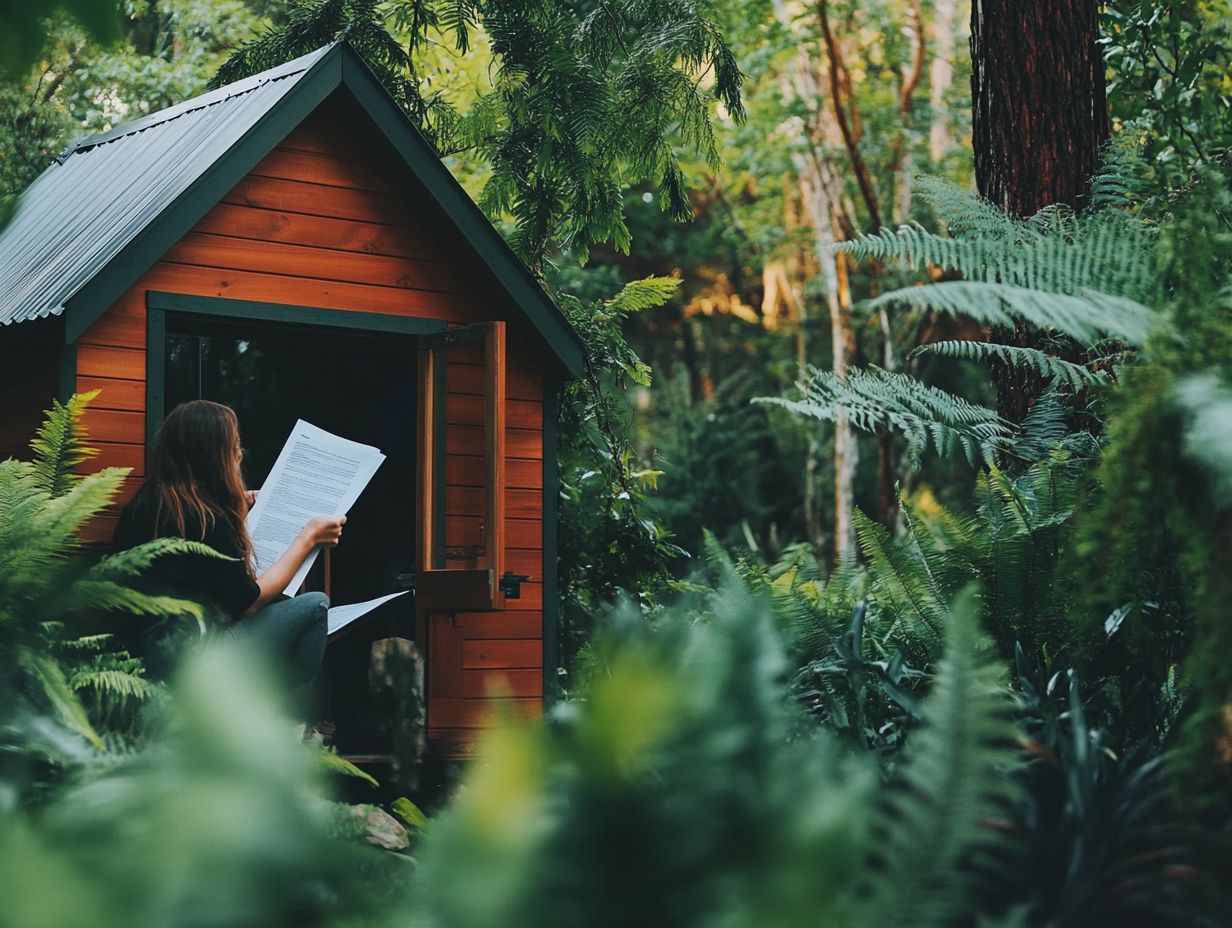
Obtaining necessary permits and following rules is crucial for you as a tiny house owner. Local building departments set the standards for what makes a legal tiny house, including inspections and approval processes. This ensures compliance with zoning regulations.
Navigating this landscape may feel daunting. However, understanding local zoning laws and securing the right building permits is vital for making sure your tiny home meets all safety standards. Typically, this involves submitting detailed plans that cover everything from utility connections to interior layouts and height restrictions. It’s also important to be aware of tiny house HOA rules that may affect your plans.
Keep an eye on regulations regarding waste management and parking, as these can vary significantly across different jurisdictions. Understanding the legal risks of building a tiny house can help ensure compliance, shielding you from potential fines or legal disputes and fostering a more sustainable living environment. This helps pave the way for greater acceptance of tiny houses within your community.
Financial Implications of Tiny House Ownership
The financial implications of tiny house ownership are substantial. As a potential owner, consider the initial costs of buying or building a tiny home as well as the ongoing expenses that come with it.
This includes utilities, maintenance, and the possible tax implications of owning a tiny house. Each factor plays a crucial role in shaping your overall financial landscape as you embark on this unique living journey.
Costs and Expenses
The costs and expenses associated with tiny houses can vary significantly. Factors such as location, materials, and design influence these costs. Understanding these expenses is vital if you’re considering a downsized lifestyle.
Construction expenses typically include the initial investment for materials and labor, which can fluctuate depending on whether you choose pre-fabricated units or custom-built designs. Land prices also play a significant role, as these homes usually require smaller plots in less populated areas.
Utilities also contribute to your overall financial picture. While tiny homes often have lower energy costs, you still need to connect to water, electricity, and waste services.
Maintenance is another aspect that shouldn’t be overlooked. Regular upkeep may differ from traditional housing. When you compare the overall expenses of tiny living with conventional homes, you’ll often find it to be a more affordable alternative. However, it’s important to be aware of tiny house laws and carefully consider all these variables before making a decision.
Tax Implications
Owning a tiny house brings unique tax implications that you should understand, especially regarding property taxes. These taxes can vary significantly based on whether your tiny home is classified as a legal dwelling or an accessory dwelling unit (a smaller, secondary home on a property).
These classifications can profoundly impact your financial responsibilities as a tiny house owner, especially given the wide variance in local regulations. If your home is deemed an accessory dwelling unit, you might benefit from reduced property tax rates, but this could also limit your ability to claim specific deductions. To ensure compliance, consider navigating tiny house community regulations.
Don’t overlook the sales taxes on materials and services related to the construction of your tiny home; these can further affect your overall affordability. Understanding these nuances, including tiny house zoning laws, is essential, as it enables you to plan your finances effectively and leverage any potential deductions or exemptions that suit your unique housing situation.
Navigating Legal Challenges
Navigating the legal complexities of tiny house ownership can feel overwhelming. As an owner, you may face a variety of disputes concerning zoning laws, building codes, and neighborhood regulations. These issues could significantly influence your living situation.
Dealing with Legal Issues and Disputes
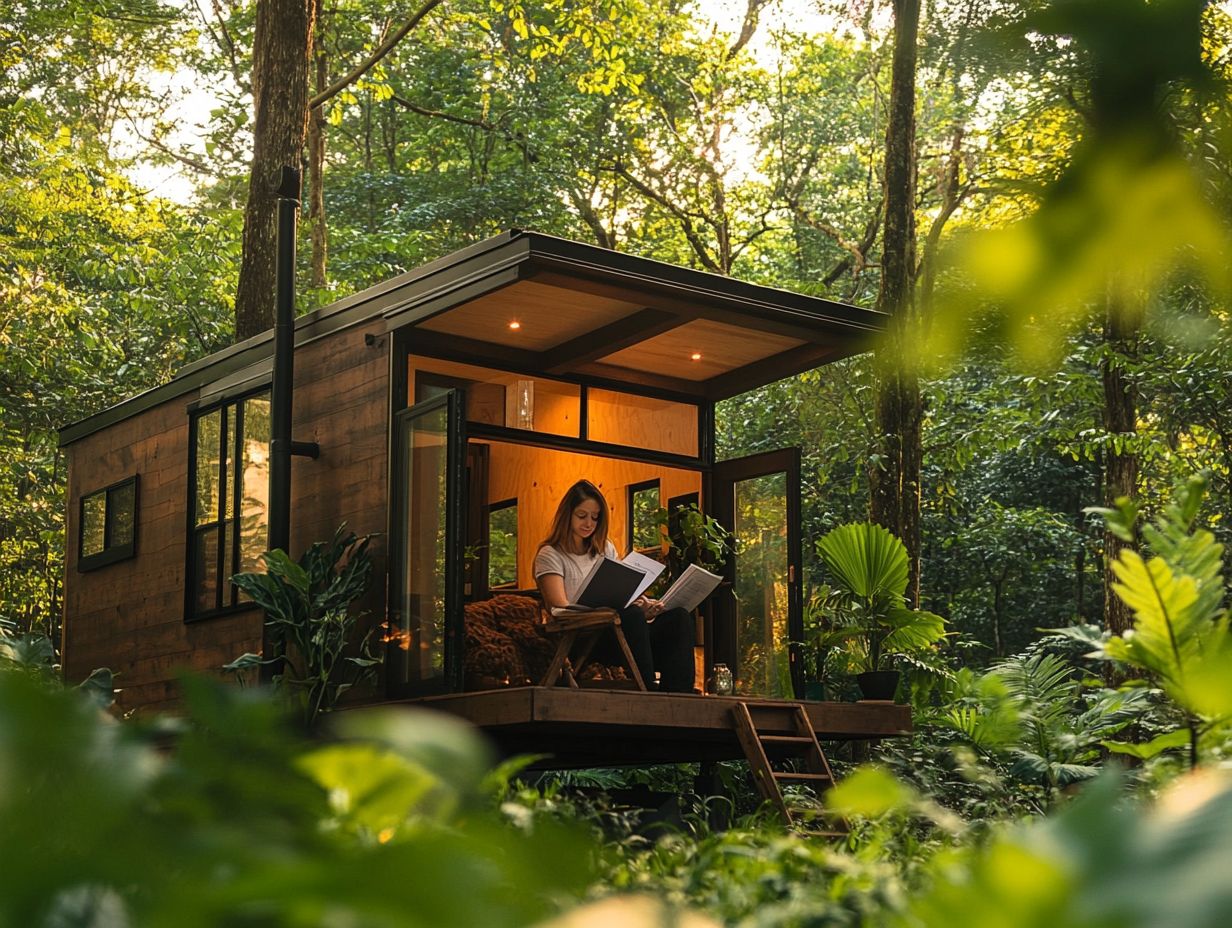
Dealing with legal issues and disputes is an unavoidable aspect of owning a tiny house. It s essential for you to take action in understanding your rights and responsibilities within your local laws.
To navigate these complexities effectively, familiarize yourself with zoning regulations. Zoning regulations are laws that dictate how land can be used. Additionally, it’s important to understand tiny house construction legalities and to review building codes and any specific restrictions that your municipality might impose.
Establishing open communication with local authorities will make it easier to address any concerns or disputes as they arise. Friendly conversations with your neighbors can help build positive relationships, which will prove invaluable if difficulties emerge.
Documenting your interactions and reviewing relevant legal documents can provide clarity and support in resolving misunderstandings. This ensures that any future legal challenges are minimized and handled smoothly.
Alternative Options for Tiny House Living
For anyone captivated by the tiny house lifestyle, a variety of alternative options are available. Consider exploring co-housing arrangements that foster a lively community spirit, or look into renting or leasing tiny homes within dedicated tiny house communities.
These choices embrace minimalism while enhancing connections with like-minded individuals, enriching your living experience.
Co-housing and Community Living
Co-housing and community living arrangements offer you an exceptional opportunity to enjoy the benefits of tiny house living. You can minimize your ecological footprint while building relationships with your neighbors.
In co-housing communities, residents often share amenities like gardens, kitchens, and recreational spaces, creating a lifestyle rooted in collaboration rather than competition.
Beyond financial savings, these arrangements promote resourcefulness and sustainability. Members exchange skills and offer support to one another. By embracing shared responsibilities and engaging in communal activities, you can enhance your quality of life and establish a network of trust and camaraderie that traditional housing often overlooks.
Renting and Leasing Options
Renting and leasing options for tiny houses are on the rise. This presents an excellent opportunity for you to immerse yourself in this lifestyle without the long-term commitment of buying or building your own tiny home.
These options cater to various preferences, from short-term rentals ideal for weekend getaways to longer leases that align with your desire for a more sustainable living choice. You can typically find short-term rentals on platforms like Airbnb or Vrbo, offering a unique experience in a cozy, compact space.
If you re looking for something more permanent, local listings or specialized websites dedicated to tiny homes provide many options. Consider factors such as location, amenities, and the surrounding community, as each tiny home offers its own distinctive atmosphere and lifestyle.
Frequently Asked Questions
What are the legal implications of owning a tiny house?
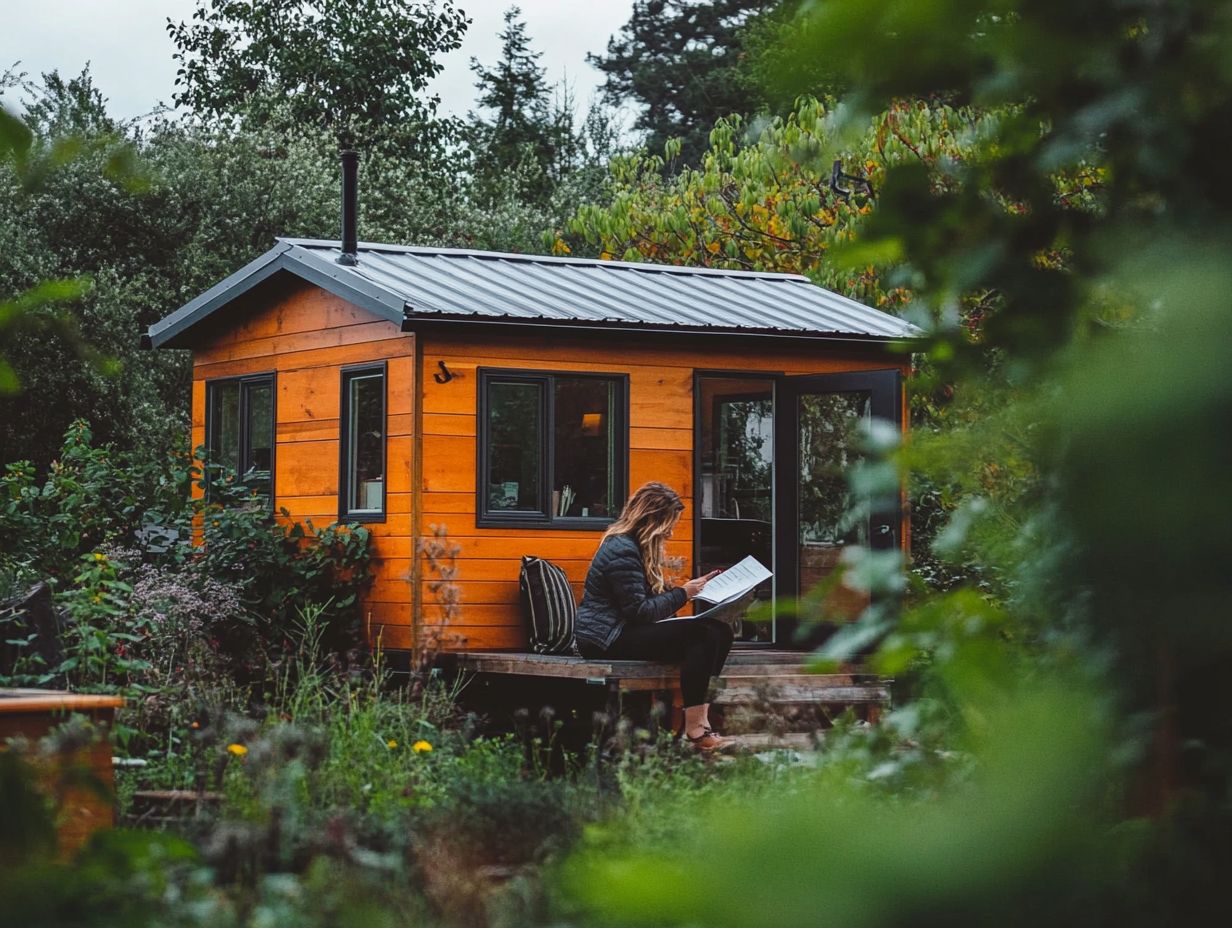
The legal implications of owning a tiny house vary depending on location. In some areas, a tiny house may be considered a recreational vehicle and have different regulations, while in others it may be classified as a permanent residence.
Do I need a building permit for my tiny house?
In most cases, yes. A building permit is required for a tiny house, but specific requirements and regulations may vary depending on the location and size of the tiny house.
Are there zoning restrictions for tiny houses?
Zoning restrictions for tiny houses vary by location. Some areas may have specific zones designated for tiny houses, while others may restrict the size and type of structures allowed on a property.
Curious about the legal implications of your tiny house? Ready to embrace tiny house living? Let s get started today!
Can I legally live in a tiny house on my own property?
Yes, you can live in a tiny house on your own property. However, there are legal requirements and regulations to consider.
Research local laws and zoning rules before making any plans.
What are the insurance implications of owning a tiny house?
Insurance for tiny houses can vary based on location and type. Sometimes, a tiny house is covered by a homeowner’s insurance policy, but other times it needs a separate policy.
What are the tax implications of owning a tiny house?
Tax rules for tiny houses change depending on where you live. In some places, a tiny house is taxed like a recreational vehicle, while in others it’s treated as a permanent home and subject to property taxes.

